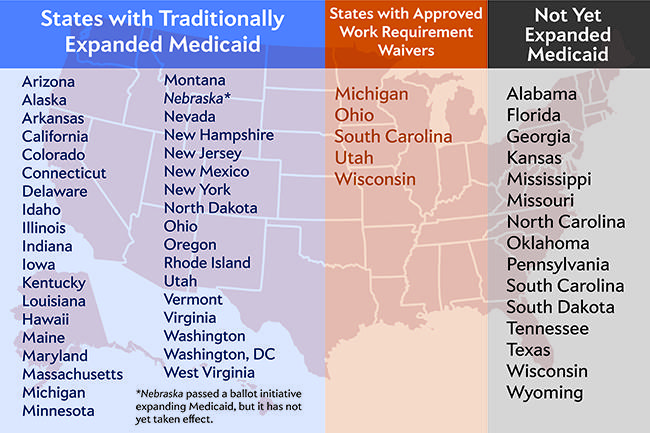February 10, 2020
Medicaid Expansion and the Unemployed
Job loss can lead in the short term to loss of health insurance and in the long term to increased mortality and adverse effects on child well-being. The Affordable Care Act (ACA) created new, subsidized health insurance options beginning in 2014 for individuals without access to employer-based health insurance, which could mitigate the consequences of job loss. Other safety net programs such as Unemployment Insurance (UI) which soften the blow of job loss may lead to longer periods of unemployment. Does Medicaid expansion increase the duration of unemployment?
In a working paper released by the National Bureau of Economic Research, SRC researcher Helen Levy and co-authors Thomas Buchmueller of the UM Ross School of Business and Robert Valletta of the Federal Reserve Bank of San Francisco use the American Community Survey, the Behavioral Risk Factor Surveillance Survey, and the Current Population Survey to address this question.
Their analysis compared insurance coverage, health care access, and labor market outcomes for unemployed workers in states with Medicaid expansion to unemployed workers in states without expansion. In 2008 through 2013, before the implementation of the ACA coverage provisions, the percentage of workers – whether employed or unemployed – who had Medicaid, private insurance, or no insurance were similar in states that would subsequently expand Medicaid compared with those that would not. Therefore, comparing what happened in the two groups of states after the implementation of the ACA gives some indication of how much of any change is due to Medicaid expansion, as opposed to other ACA reforms.
When the main coverage provisions of the ACA came into effect in 2014, insurance coverage increased in both groups of states, but the gains were much larger in states that expanded Medicaid than in those that did not. In Medicaid expansion states, the fraction of unemployed workers who were uninsured was cut in half, from about 40 percent to 20 percent. The analysis also found larger reductions in the fraction of unemployed workers who had delayed getting needed medical care in expansion than in non-expansion states.
But did these gains in insurance and access to medical care reduce job-finding?
To answer this question, the authors used monthly Current Population Survey data on unemployed individuals for 2007-2017 and did not find a statistically significant effect on job-finding behavior or labor force attachment. On the contrary, for some subgroups of the unemployed – specifically, those with children and those who had been unemployed less than a year – Medicaid expansion actually made them less likely to exit the labor force (that is, to give up on finding a job). In other words, the increases in coverage and access to care that resulted from Medicaid expansion did nothing to discourage unemployed workers from finding jobs.
How can it be that such a substantial benefit did not affect job search behavior? The authors speculate that part of the reason may be that Medicaid benefits – unlike, for example, UI benefits, which are paid in cash – can't be used to pay other expenses; they only cover health care. And the typical unemployed household was not spending very much on health care to begin with. Therefore, getting Medicaid improves one aspect of life for households with an unemployed adult, but does little to lessen the underlying need to find work.
This result should help to inform current debates about imposing work requirements on the Medicaid program. One reason states are considering such requirements is out of concern that Medicaid reduces the incentive for beneficiaries to work. This study shows that for one important subgroup – the unemployed – there is no evidence to support the idea that Medicaid discourages work.

States with Approved Work Requirement Waivers: Michigan, Ohio, South Carolina, Utah, and Wisconsin
Not Yet Expanded Medicaid: Alabama, Florida, Georgia, Kansas, Mississippi, Missouri, North Carolina, Oklahoma, Pennsylvania, South Carolina, South Dakota, Tennessee, Texas, Wisconsin, and Wyoming
Thomas C. Buchmueller, Helen G. Levy, and Robert G. Valletta (2019). Medicaid Expansion and the Unemployed. Cambridge, MA: National Bureau of Economic Research.